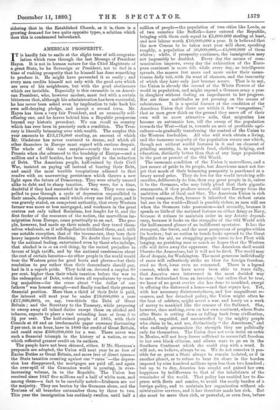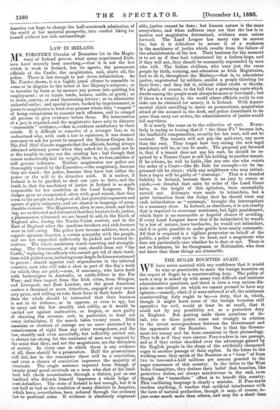AMERICAN PROSPERITY.
TT is hardly fair to smile at the slight tone of self-congratu- lation which runs through the last Message of President Hayes. It is not in human nature for the Chief Magistrate of a great State, be he Sovereign or President, not to feel in a time of rushing prosperity that he himself has done something to produce it. He might have prevented it so easily ; and every man credits himself not only with the good acts which are seen of his neighbours, but with the good abstinences which are invisible. Especially is this excusable in an Ameri- can President, who, however modest, must feel with a certain bitterness that, although his administration has been successful, he has never been asked even by implication to take back his own self-denying pledge, and accept a second term. Mr. Hayes has been a very fair President, and an unusually self- effacing one, and he leaves behind him a Republic prosperous beyond any historic precedent. We can recall no country which has ever been in precisely such a condition. The Trea- sury is literally brimming over with wealth. The surplus this year amounts to £13,176,000 sterling, an amount of which Mr. Gladstone has never ventured to dream, and which all other financiers in Europe must regard with envious despair. The whole of this -vast surplus—nearly the revenue of Prussia when she advanced to the headship of Europe—and a million and a half besides, has been applied to the reduction of Debt. The American people, half-ruined by their Civil War, insisted on paying off instead of bearing their Debt, and amid the most terrible temptations adhered to that resolve with an unswerving persistence which throws a new light upon the future of Democracy. They were utterly unused alike to debt and to sharp taxation. They were, for a time, doubtful if they had succeeded in their war. They were com- pelled to pass through a cycle of depression unparalleled in their annals, depression amid which every one felt poor, and it was gravely stated, on competent authority, that every Western farmer was more or leas mortgaged, and workmen in the great centres not only talked Socialism, but fought for it, and the first feeder of the resources of the nation, the marvellous im- migration from Europe, came practically to an end. The peo- ple, however, had made up their minds, and they taxed them- selves wholesale, as if self-flagellation titillated them, and, with one notable exception, that of the income-tax, they bore their heavy imposts without flinching. No doubt they were helped by the national feeling, entertained even by those who indulge, that alcohol is in se an evil thing, by the rooted prejudice in favour of high tariffs, and by the national carelessness about the cost of certain luxuries—no other people in the world would bear the Western price for good boots and gloves—but their resolution to pay rather than their descendants should pay, had in it a superb pride. They held on, devoted a surplus 80 per cent. higher than their whole taxation before the war to the redemption of Debt, voted down all repudiators by crush- ing majorities—for the craze about "the dollar of our fathers" was honest enough—and finally reached their present financial position. More than a third of their Debt is paid, the interest will next year be under £18,000,000 a year (£17,800,000), or, say, two-thirds the Debt of Great Britain ; and the Secretary to the Treasury, while proposing to sweep away all inland duties except those on alcohol and tobacco, expects to place a vast refunding loan at from 3 to per cent. The half-ruined people of 1865, with their Consols at 48 and an irredeemable paper currency fluctuating 2 per cent. in an hour, have in 1880 the credit of Great Britain, and could raise £300,000,000 for a war. There never was such a financial triumph in the history of a nation, or one which reflected greater credit on its authors.
The people have not been skinned, either. If Mr. Sherman's proposals are adopted, the Union will next year be as free of Excise Duties as Great Britain, and more free of direct taxes— the State taxation counting against our "rates "—the depres- sion has disappeared, the mortgages are paid off, and again the over-spill of the Caucasian world is pouring, in ever- increasing volume, in to the Republic. The Union has received since 1847 five millions and a half of white men, and among them—a fact to be carefully noted—Irishmen are not the majority. They are beaten by the Germans alone, and the Teutons of all branches outnumber them by three to two. This year the immigration has suddenly swollen, until half a million of people—the population of two cities like Leeds, or of two counties like Suffolk—have entered the Republic, bringing with them cash equal to £5,000,000 sterling at least, and new labour worth £10,000,000 a year. It is believed that the new Census to be taken next year will show, speaking roughly, a population of 50,000,000,-45,000,000 of them whites ; while, if prosperity continues, the immigration may not impossibly be doubled. Every day the means of com- munication improve, every day the exhaustion of the Euro- pean continent is more felt, while every day, as intelligence spreads, the masses fret more and more under their mono- tonous daily toil, with its want of chances, and the insecurity of which they have only just become aware. That is to say, the Union is already the second of the White Powers of the world in population, and might expend a German army a year in slaughter without feeling an impediment to her progress. Nor are these multitudes as yet pressing on the means of subsistence. It is a special feature of the condition of the American Union that there are within it few "congestions," that as men grow thick on the ground they move off of their own will to more attractive soils, that migration has become an automatic law, till the sweep of the population towards the West—that is, towards an area of profitable agri- culture—is gradually transferring the control of the Union to the Western freeholder. All who will work obtain a living, and the immense majority of the population secure one which, though not without sordid features in it and an element of grinding anxiety, is, as regards food, clothing, lodging, and education, distinctly better than that of any large population in the past or present of the Old World.
The economic condition of the Union is marvellous, and a just source of pride to its people, but Americans must not for- get that much of their brimming prosperity is purchased at a heavy moral price. They do less for the world involving self- sacrifice, deliberately do less, than any great people in it, unless it be the Germans, who may fairly plead that their gigantic armaments, if they produce unrest, still save Europe from the ambition alike of Gaul and Slay. The American Union is rich beyond compare, first, because it inherited the richest estate but one in the world—Brazil is possibly richer, as men will see when the Germans take possession—and secondly, because it spends so little of the national fortune on either Army or Navy, because it refuses to maintain order in any Asiatic depend- ency, because it looks on the struggles of the Old World with the half-amused glance of an indifferent spectator. It has the strongest, the freest, and the most prosperous of peoples within its borders ; but no nation in bonds looks upward to the Great Republic for aid, no struggling people turns to her Fleet with longing, no perishing race so much as hopes that the Western rifle will drive away the oppressor. One American shell would liberate the Armenians, but it will not be fired. The world may die of despair, for Washington. The most generous individually of races will collectively strike no blow for foreign freedom, send no fleet, issue even no command. There is a legend current, which we have never been able to trace fully, that America once intervened in the most decided way to save Switzerland from an invasion ; but unless that be true, we know of no great service she has done to mankind, except in offering the distressed a home—and that repays her. Yet, with her necessary disinterestedness, and her magnificent re- sources, and her detached policy, the Union might often be the best of arbiters, might arrest a war, and hurry on a work of mercy to mankind like the erasure of the Sultanet. She, however, does nothing, even on her own continent, where State after State is rotting down or falling back from civilisation, unaided, unguided, and uncontrolled by the mighty people who claim to be, and are, distinctively "the Americans," and who endlessly accumulate the strength they use politically only for themselves. The Union does not even insist on order in Mexico, will not keep forces sufficient to secure full freedom to her own black citizens, and allows wars to go on in the Southern Continent which she could stop with a word. It will not, we believe, always be so. We do not conceive it pos- sible for so great a State always to remain isolated, as if in another planet, or to refuse to bear its share in the burden imposed by nine hundred millions upon less than two hundred ; but up to to day, America has sought and gained her own happiness by indifference to that of the inhabitants of the remainder of the world. That policy has enabled her to dis- pense with fleets and armies, to avoid the costly burden of a foreign policy, and to maintain her organisation without ad- ministrative services, and it has therefore made her rich. But she must be more than rich, or powerful, or even free, before America can hope to change the half-awestruck admiration of the world at her material prosperity, into cordial liking for herself without her rich surroundings.







































 Previous page
Previous page